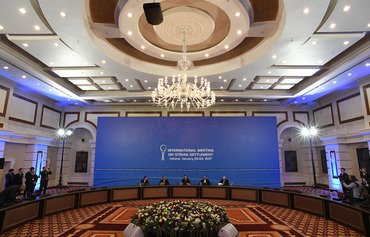Though the recent ceasefire in Syria brokered by the US and Russia has ended, the brief window of calm it provided offered a glimpse of what can be possible if a political solution succeeds, observers tell Diyaruna.
The ceasefire went into effect on September 12th and collapsed a week later on Monday (September 19th) when Syria's army accused opposition groups of violating the terms of the agreement and declared the truce was over.
The cycle of violence quickly resumed, with a deadly strike targeting a joint UN, Red Cross, and Red Crescent convoy delivering aid to the town of Orum al-Kubra in Aleppo province sparking harsh recriminations among the stakeholders. Also on Wednesday (September 21st), deadly clashes and bombardments resumed in the city of Aleppo.
Following a Tuesday meeting with Russia and key stakeholders on the sidelines of the UN General Assembly, however, US Secretary of State John Kerry insisted that hopes for a ceasefire in Syria remain alive.
In brief remarks as he left a meeting of the 23-nation International Syria Support Group (ISSG), Kerry said talks would reconvene later this week.
Activists and journalists on the ground pointed to a sharp decline in violence during the ceasefire period, save for some sporadic violations by armed extremist groups who had announced they would not abide by the ceasefire.
Residents of embattled Aleppo said airstrikes and shelling were not heard in the first few days of the ceasefire, AFP reported, while the Syrian Observatory for Human Rights said the death toll had been far lower than usual.
Military solution doomed to fail
Though the violence has resumed, the warring sides are increasingly convinced they will not prevail through battle, said political researcher Abdul Nabi Bakkar, a professor at Al-Azhar University’s faculty of sharia and law.
"Both the armed opposition groups and regime forces have reached the exhaustion stage after five years of conflict and military operations," he told Diyaruna. "Both sides have become convinced that they have entered a war of attrition wherein a military solution is impossible to achieve."
But there are many challenges to bringing about an end to the fighting.
In opposition-controlled areas, armed extremist groups will try to inflame the situation and violate ceasefire agreements in order to preserve their existence, Bakkar cautioned.
Meanwhile, in regime-controlled areas, he said, there are armed groups and factions affiliated with the regime that have political aims and calculations of their own.
"Everyone has come to realise that the solution in Syria, even if it takes a long time to achieve, is a political solution," said Syrian journalist Mohammed al-Abdullah, who resides in Cairo.
"Both sides have failed to impose a solution through military action," he told Diyaruna.
The short-lived ceasefire may yet succeed in laying the groundwork for the next phase of combating the "Islamic State of Iraq and the Levant" (ISIL) and other armed extremist groups, he said.
Hopes remain for political solution
Abdullah al-Hassan, a Syrian merchant from the city of Hama who currently resides in Cairo, told Diyaruna he did not really believe the truce would hold, pointing to previous failed attempts to calm the situation.
But he still hoped it would endure, he said.
"I hope the peace process is expedited and a solid foundation is laid for the Syria of tomorrow in a way that guarantees a dignified life and puts an end to the massacres and destruction," he added.
There is still a chance to achieve new gains through a political solution that would be in the interest of the Syrian people, first and foremost, al-Hassan said.
For the time being, however, he said he will remain in Cairo.
"It is too early to talk about returning, as most areas are devastated and do not have the necessities of life, and ISIL continues to pose a threat," he said.
"Syrians of all current affiliations want the ongoing bloodbath to end, and all agree the central dilemma currently is represented by the terrorist groups who exploited the situation to proliferate in many areas," said Damascus University economics professor Halim al-Ramli.
An enduring truce would be a "golden opportunity to open a real war against terrorism with everyone’s participation", he told Diyaruna.
This would in turn lead to a return to internal dialogue among Syrians that would lay the groundwork for the future, al-Ramli added.
After all the suffering of the past years, he said, the Syrian people are in desperate need of "a quick and urgent political solution".

![Syrian children in Aleppo take advantage of the brief ceasefire to enjoy Eid al-Adha. [Photo courtesy of Mohammed al-Abdullah]](/cnmi_di/images/2016/09/21/6213-Syria-aleppo-children-600_384.jpg)




